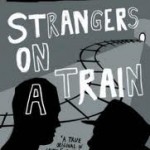Our book choice for December 2010 is Strangers on a Train, by Patricia Highsmith. Architect Guy Haines wants to divorce his unfaithful wife, Miriam, in order to marry the woman he loves, Anne Faulkner. While on a train to see his wife, he meets Charles.
Anthony Bruno, a psychopathic playboy who proposes an idea to “exchange murders”: Bruno will kill Miriam if Guy kills Bruno’s father; neither of them will have a motive, and the police will have no reason to suspect either of them. Guy does not take Bruno seriously, but Bruno kills Guy’s wife while Guy is away in Mexico.
 Bruno informs Guy of his crime, but Guy hesitates to turn him in to the police. He realizes that Bruno could always claim Guy’s complicity in the planned exchange murders, and the longer he remains silent, the more he implicates himself. This implicit guilt becomes stronger as in the coming months. Bruno makes appearances demanding that Guy honor his part of the bargain. After Bruno starts writing anonymous letters to Guy’s friends and colleagues, the pressure becomes too great, and Guy murders Bruno’s father.
Bruno informs Guy of his crime, but Guy hesitates to turn him in to the police. He realizes that Bruno could always claim Guy’s complicity in the planned exchange murders, and the longer he remains silent, the more he implicates himself. This implicit guilt becomes stronger as in the coming months. Bruno makes appearances demanding that Guy honor his part of the bargain. After Bruno starts writing anonymous letters to Guy’s friends and colleagues, the pressure becomes too great, and Guy murders Bruno’s father.
Subsequently, Guy is consumed by guilt, whereas Bruno seeks Guy’s company as if nothing had happened. He makes an uninvited appearance at Guy’s wedding, causing a scene. At the same time, a private detective, who suspects Bruno of having arranged the murder of his father, establishes the connection between Bruno and Guy that began with the train ride, and suspects Bruno of Miriam’s murder. Guy also becomes implicated due to his contradictions about the acquaintance with Bruno.
When Bruno falls overboard during a sailing cruise, Guy identifies so strongly with Bruno that he tries to rescue him under threat to his own life. Nevertheless, Bruno drowns, and the murder investigation is closed. Guy, however, is plagued by guilt, and confesses the double murder to Miriam’s former lover. This man, however, does not condemn Guy; rather, he considers the killings as appropriate punishment for the unfaithfulness. The detective who had been investigating the murders overhears Guy’s confession, however, and confronts him. Guy turns himself over to the detective immediately.
Discussion Questions
- What was your initial feelings towards Bruno? Did they change over the course of the novel? Is he mad?
- Considering Guy
- Guy seems troubled even before meeting Bruno. Was this, in a sense, inevitable?
- Why didn’t Guy go to the police immediately after Miriam’s murder?
- Why did Guy kill Bruno’s father?
- After he committed the murder, how did your perception or experience of Guy change?
- Were you ever frustrated by Guy’s actions?
- Is Guy psychologically disturbed?
- What role do women play in the book? What’s your opinion of Miriam? Of Anne? What do they represent?
- Highsmith introduces the idea of individual duality, that there are opposites in the world, compeitng forces between good and evil. What larger point is Highsmith making?
- More generally, what is Highsmith saying about the nature of evil?
- What did you make of Bruno’s death? Was it suicide?
- Did you find the ‘trap’ at the end of the book believable?
- The film is notably different from the book. Did the difference affect your reading experience?
- Would you recommend the novel?
Individual Rating
DKB Rating 





